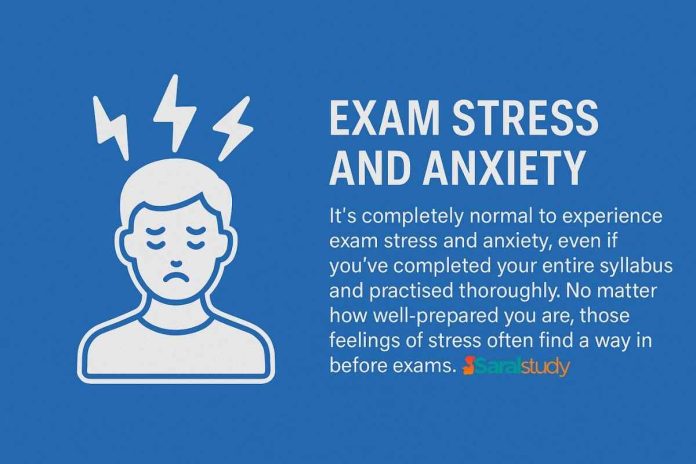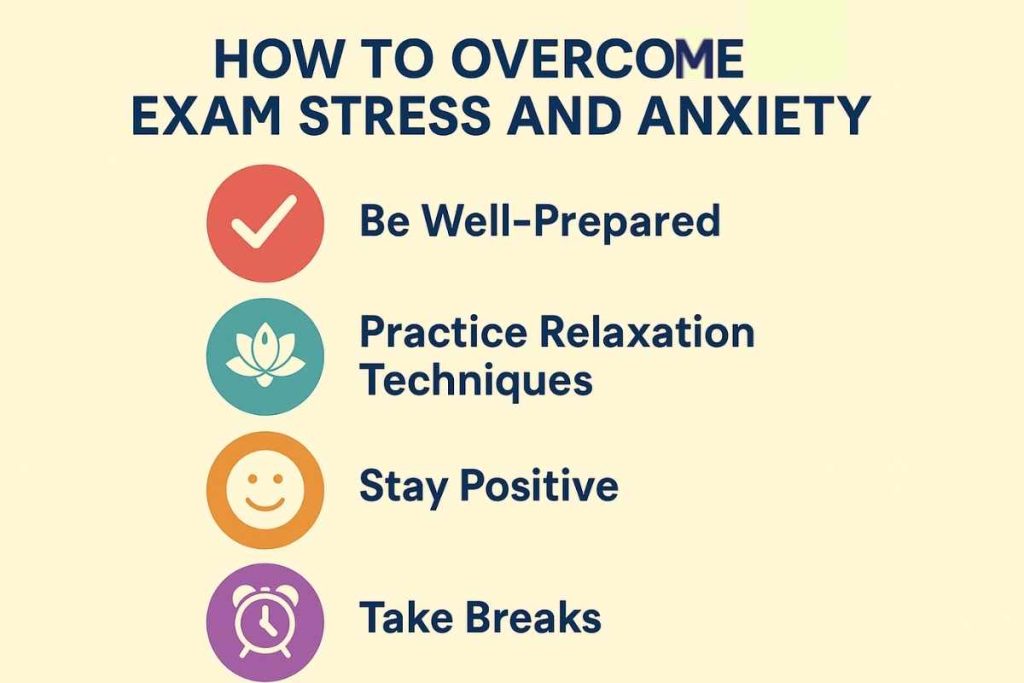It’s completely normal to experience exam stress and anxiety, even if you’ve completed your entire syllabus and practised thoroughly. No matter how well-prepared you are, those feelings of stress often find a way in before exams.
Stress stems from uncertainty, and an exam is an uncertain scenario.
The Good Stress And The Bad Stress
Stress is not necessarily bad. In psychology, stress can be categorised into two types: eustress, which is the good stress, and Distress, which is the bad stress.
Eustress helps you get things done, like completing the assignment, to get it done before the submission. Whereas, Distress hinders your performance.
They are two components of the same spectrum; too little or too much stress is not healthy.
Now, imagine you have your exam in a few weeks. If you don’t feel stressed, you might not start studying, whereas if you stress a lot, you might end up hindering your cognitive functioning, such as learning and memory.
Causes of Exam Stress
To cope with exam stress, it becomes important to identify what causes stress.
Stress during or before the exams could result from various reasons, it could be a natural response of your body or your negative perception of the exams.
The following are some causes of exam stress:-
1. Poor Time Management
Poor time management can lead to less preparation, a lack of structure, and less satisfaction with exam preparation.
It causes panic ahead of the exam, causing anxiety.
2. Fear of failure
Many students fear underperforming or failing, often due to societal beliefs that view failure negatively and equate it with a lack of ability or potential. This mindset creates unnecessary pressure, as students internalise the idea that their worth is tied to their academic success.
3. Natural response of the body
The amygdala is a part of the brain responsible for detecting threats and protecting us from them. Although it was for physical threats, it evolved into mental and emotional threats as well. Therefore, the stress and anxiety we feel regarding the exam could be a natural bodily response to protect us from the danger that our body perceives as an uncertain feeling of exams.
4. High expectations and Negative thinking
Students are often faced with high expectations from themselves, their family and peers to perform well in academics. This creates a lot of pressure and distress for an individual. It is also accompanied by negative thinking and perception of oneself, leading to self-doubt and low self-esteem.
5. Lack of Preparation
Lack of studying, procrastination, or poor study skills are often the cause of this lack of preparation. Finding that you have not studied the material adequately can cause stress and anxiety when the exam draws near.
6. Previous Negative Experience
When one has experienced a negative prior experience with exams, like not performing well, difficulty preparing for the subject, previous encounter with exam stress and anxiety, it can make it difficult for the individual to overlook the possibility of it. This, in turn, causes stress and anxiety related to exams.
How To Overcome Exam Stress And Anxiety
No matter how overwhelming the situation feels, your stress and anxiety could be managed. The following techniques and exercises are divided into two broad categories, ones which could be utilised during exams and the ones which could be utilised before the exams to prevent stress and anxiety ahead of time.
A. During Exams
Relaxation Techniques
Relaxation techniques consist of the following exercises-
- Body Scan – This exercise includes consciously focusing on the body parts, in the upward or downward direction of the body. This helps us direct our stress and anxiety into focus and concentration, making us feel relaxed and present in the moment.
- Progressive muscle relaxation – This exercise includes releasing the tension in the muscle groups, such as arms and legs or back and torso. This helps release the physical tension that resulted from stress.
Symptoms of anxiety and stress are characterised by rapid heartbeats, muscle tension and breathlessness. Relaxation techniques are based on the principle of regulating physiological arousal. When we consciously engage in relaxation techniques such as body scan and progressive muscle relaxation, it counteracts those symptoms and reduces them.
Breathing Exercise
It includes to breath slowly and calmly on counts. These counts can vary depending on different variations. For example- Square Breathing-inhaling for four counts, holding for four, exhaling for four and holding for four again.
Social and Emotional support
Connecting with friends or loved ones can help you feel more relaxed and less tense. Sharing your emotions with others also helps the brain to regulate emotions. You may also talk to a counsellor.
It is also a time-efficient way if technology is used, such as talking on the call, video calls and chats.
Cognitive Restructuring
According to cognitive behavioural psychology, negative emotions and feelings are a result of maladaptive beliefs and thought patterns.
For example, you might hold a belief that you are not good at academics and hence can never score well. This strengthen your negative self-belief of self doubt and poor capabilities. This can be tackled if you restructure your cognitive beliefs and reminding yourself of your potential and achievements. You can use techniques such as positive affirmations and counter any negative thought by a positive one. This will eventually change your cognitive process, making you feel less stressed and anxious.
Physiological Health
Adequate health and sleep are building blocks of a healthy body and mind. It’s important to have quality sleep routine and have a proper, balanced meal every day. Studies have shown good quality sleep is associated with enhanced cognitive functioning.
Regular physical exercise is also important for the body and the mind. Physical exercise increases endorphins in the mind, which is a hormone associated with happiness and hence regulates stress level in the body.
B. Before Exams
Cultivating Good Habits
Cultivating good habits makes life more effective, keeps emotions in check and leads to overall well-being of an individual. Good Habits could consist of taking care of your physical needs such as exercising, eating healthy food, and maintaining hygiene, whereas, for your mental health, practicing mindfulness, journaling, challenging negative thought could be some of them.
- Meditation: Meditation is a mindfulness practice where an individual closes his/her eyes and concentrates on their breathing. There are variations of meditation to practice too, such as repeating mantras, one with gentle movements, one with focusing on one external object, one with visualisation, etc. Meditation has numerous benefits such as enhancing sleep quality, lowering blood pressure, improving cognitive functions such as concentration, learning and memory, reducing anxiety, etc.
- Exercise: Physical exercise is an important component of a healthy mind and body, whether it be cardio, yoga or pilates. Exercise regularly is established to alleviate exam stress and anxiety by suppressing stress hormones, enhancing mood-stimulating endorphins, enhancing sleep, and cognitive functioning. Short periods of exercise bring instant relief, whereas regular exercise enhances long-term resilience, which enables students to cope with academic pressure and function better on the exam day.
- Journaling: Journaling is a scientific strategy for limiting exam anxiety and stress by assisting with emotion regulation, clarification of thoughts, and stressor identification. Journaling has been shown to enhance emotional regulation, reduce self-negative talk, and increase well-being, making it an excellent, affordable tool for academic pressure management.
If you are new to Journaling, you can use prompts available on the internet or start by describing your feelings, what triggered them and how you handled them, it gives you a clearer picture of your emotions and emotional pattern.
Structure study and Organisation
Studies indicate that systematic study and organisation, for example, planning, goal setting with specificity, and using active learning methods, tremendously decrease stress and anxiety related to exams. Those who stick to a study routine and utilise metacognitive strategies have lower test anxiety and better academic achievement than do their unstructured counterparts. You can start small by making a routine for one week and then see how you can utilise it further.
Time management
Time management refers to utilising time in an effective manner, prioritising important tasks, eliminating distractions and distribute your time well withing tasks. Good time management has a very strong correlation with decreased stress and anxiety levels when sitting exams. It has been found that students who organise themselves, prioritise tasks, segment work into smaller steps, and follow structured study timetables receive less last-minute pressure and achieve better grades. These techniques counteract procrastination, enhance work-life balance, and promote total well-being.
Balanced lifestyle
A balanced lifestyle refers to lifestyle choices with healthy eating, regular exercise, regular sleep, time management, and relaxation, which greatly improve academic and emotional functioning. Studies indicate students with balanced lifestyles enjoy enhanced concentration, memory, and mood, less stress and anxiety, increased resilience, and improved overall health, aiding both academic and personal achievements.
Conclusion
It’s very unlikely that you haven’t felt stressed or anxious before your exams. Whether you have completed the whole syllabus or practised a hundred times, stress still finds a way in. But as we’ve explored, stress isn’t all bad—eustress can push us to get things done, while distress can hold us back. The real challenge is finding that balance and understanding where your stress comes from, whether it’s poor time management, fear of failure, high expectations, or just your body’s natural response to uncertainty. The good news is, there are practical, research-backed ways to manage it. Techniques like relaxation, breathing exercises, social support, cognitive restructuring, good sleep, exercise, journaling, structured study, and time management can all make a real difference.
A balanced lifestyle is not just a luxury, it’s a necessity for your mind and body. Remember, exams are just one chapter in your life, not the whole story. Be kind to yourself, reach out for support when you need it, and trust the process you’ve put in place. With the right strategies, you’re not just preparing for exams, but building resilience for whatever comes next. Start small and believe in yourself, you’ve got this.
Also Read: The Science Behind Effective Study Habits: Boost Your Learning Efficiency






